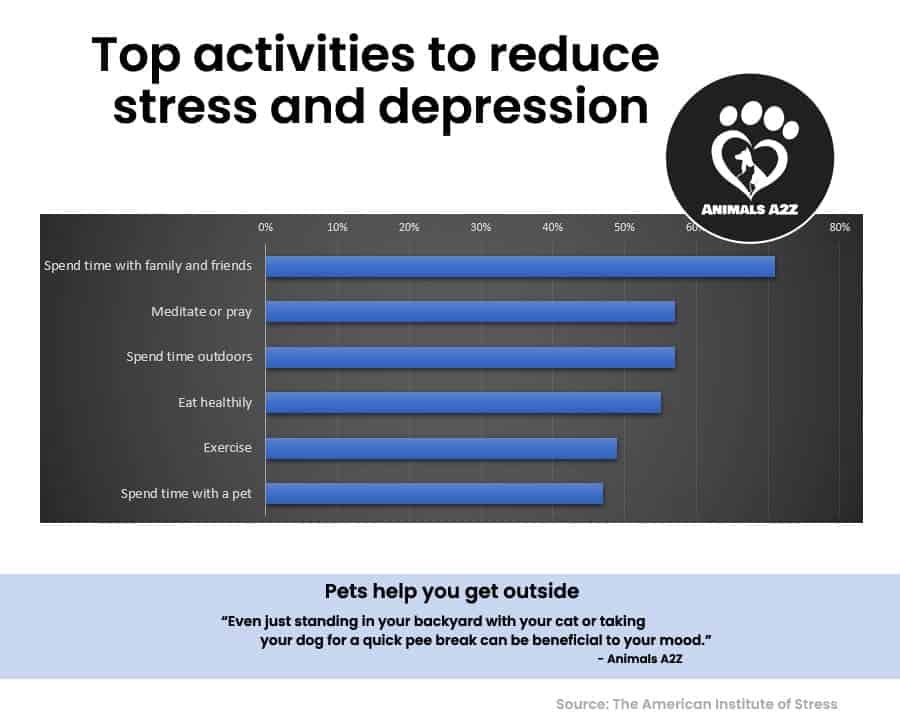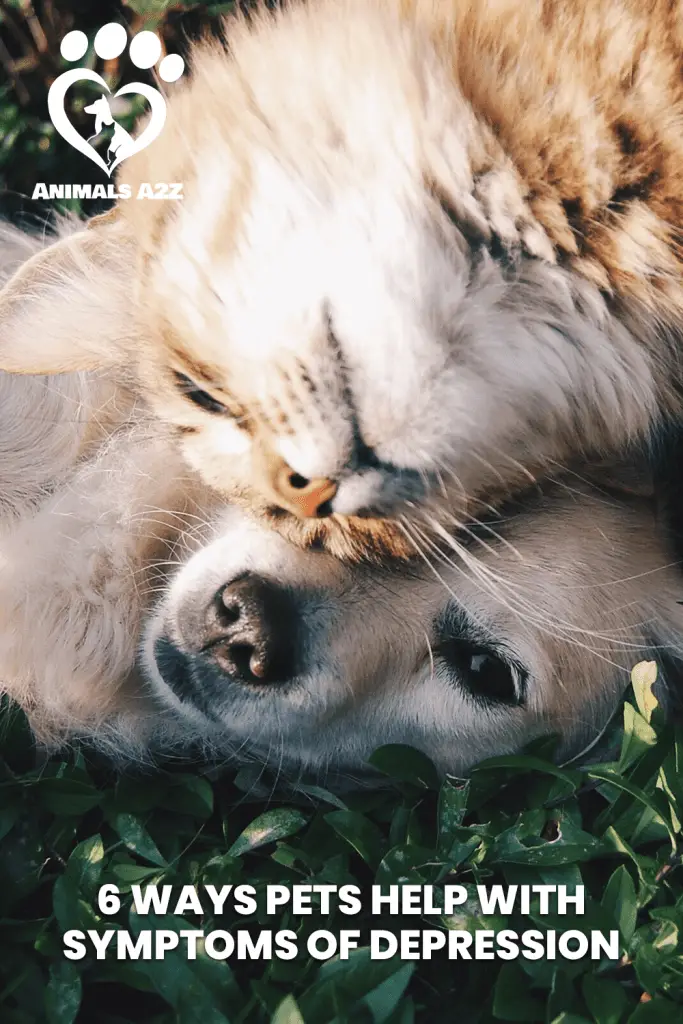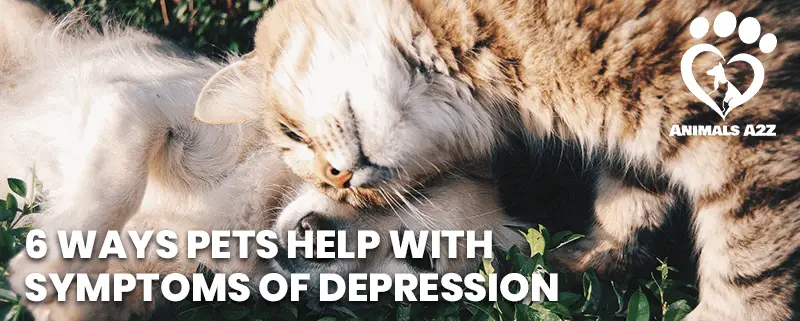This year has been difficult for a lot of people. More and more people are dealing with mental health issues like depression, anxiety and loneliness. Covid-19 has taken a toll on our relationships, wallets and mental well-being.
Fortunately, there is something that can greatly improve your mood and quality of life during these difficult times – having a pet. Curling up with your pet in an instant mood booster, especially now when most people are social distancing and don’t have as much regular human contact.
Table of Contents
How pets help with symptoms of depression
One of the main symptoms of depression is loneliness and having a pet can help combat this. Many pets are very loyal and love to be with their owners.
When you’re sitting on the couch reading a book, they are likely to curl up next to you. If you’re in the bathroom getting ready for the day, perhaps your cat will rub its body against your ankles. Your dog might eagerly greet you at the door every time you come home.
Pets usually love their owners unconditionally, so they can help make their pet parents feel valued and loved. In a time when many of us are missing human connection and support, pets can give us a supportive relationship and a feeling of purpose.
Pets make us calm
There’s no doubt that we’re all feeling a bit more anxious these days. Turning on the news and hearing about the latest corona fatalities or lock downs can increase our heart rates and stress levels.
But sitting and petting your cat can instantly help you to feel more relaxed. Physical touch increases oxytocin, also known as the “love hormone” or “cuddle hormone.” When oxytocin is released, we feel an increase of positive emotions.
Touch also reduces cortisol levels. Cortisol is known as the “stress hormone.” So, cuddling with or petting your furry friend can instantly make you feel more relaxed and give you a more positive outlook on things. Cuddling up with your pet can actually reduce your blood pressure and heart rate, helping you feel much less anxious.
There is a reason the number of ESAs, or Emotional Support Animals, are on the rise. Even if you don’t feel the need for a certified support animal, any regular pet will have a positive effect on your health and mental well-being.
Pets make us follow a schedule
Whether you are working from home or perhaps lost your job due to corona, you’re probably spending a lot more time in sweatpants and being less active than you used to be. This can lead to feels of lethargy and uselessness. Having a pet forces you to get off the sofa and gives you a sense of purpose.
Whether you feel like it or not, your pet needs to be taken care of. She needs food, water, grooming, or a walk. Your pet depending on you will give you a reason to get out of bed in the morning. This sense of responsibility leads to feelings of value and self-worth.
Pets make us move
Exercise is beneficial for dealing with depression. Laying in bed all day or binging Netflix for 8 hours will probably leave you feeling more exhausted and worse about yourself than when the day began.
It’s easy to think of excuses for why we shouldn’t go out. It’s cold. I didn’t wash my hair. It’s raining. I don’t feel like it. There’s a pandemic. But your dog or cat doesn’t care about any of that. Taking your pet outside and getting some fresh air yourself is an instant mood booster and will help manage symptoms of depression.
Getting fresh air and exercise, whether it’s a short visit to the dog park or a 5-mile run, is proven to alleviate symptoms of depression. Even just standing in your backyard with your cat or taking your dog for a quick pee break can be beneficial to your mood.

Play with your pet
Playtime is a definite mood booster. If your cat sees you moping around all day, he might begin to mimic your behavior. But dedicating time to playing with your pet will make both of you feel happier.
Playing with your pet can elevate your serotonin and dopamine levels to help you feel calmer and more relaxed. Serotonin is what helps regulate your mood, making you happier and more emotionally stable. Dopamine, also known as the “feel-good” or “happy hormone,” is a part of your brain’s reward system and does what it says it’ll do, makes you feel good.
Watching your cat chase a laser around your living room or your dog retrieve a stick is a good way to increase your serotonin and dopamine levels, making you both feel more content.
Purring is therapeutic
It’s not your imagination, your cat’s purr can make you feel more relaxed. There is evidence that the sound and volume range (20-140 Hz) of a purr can actually lower stress and blood pressure in humans who hear it. Sitting with your purring kitty is an instant anxiety reducer in these stressful times.
Pets make us socialize
One of the main reason depression rates have increased during the pandemic is due to our lack of socialization. Humans have an innate need to feel connected to other people, something which has suffered under the coronavirus. This year people are staying home more than ever and not meeting many new people.
Taking your dog out for a walk usually forces you to at least smile other people and often engage in small talk. There’s a good chance your friendly dog won’t maintain social distance from the neighbor’s dog, which usually leads to you making chit chat with the neighbor. As long as you keep a safe distance and follow local mask guidelines, this little act of socialization can do wonders for your mood.
Pets are good companions
These days many people aren’t socializing as much and if they are it’s through a screen or at a distance. Luckily, your pet doesn’t care about social distancing.
Although our number of human social contacts might be lower now, having a pet at home is an instant friend who will help you overcome feelings of loneliness. Knowing your pet is always ready and eager to see you can give you a feeling of value and being needed.
The give and take in a human-animal relationship goes both ways. You and your pet can give each other feelings of love and support, and both feel happy and fulfilled with each other’s companionship. As a plus, your pet can’t usually argue with you and probably doesn’t have as many annoying habits as human roommates.
Video: 6 ways pets help with symptoms of depression
Picking out a pet
If you don’t already have a pet at home and have been feeling a bit blue this year, perhaps adding a furry companion to your life if just what you need. However, there are a couple things you should consider before bringing a new pet home.
Find a pet that suits your personality and lifestyle
Some cat breeds are known for being playful and attention-seeking while others are more aloof. Some dogs need an hour of vigorous exercise a day, while others can thrive spending most of their time in a small apartment.
When choosing a pet, make sure you consider your own needs. Will having a high-maintenance puppy or a cat who constantly wants to play bring you joy, or add more stress? Do you want a kitty who loves to cuddle? Will you feel rejected with a more aloof breed?
Take a look at the typical breed characteristics and choose one you think will be a good match for your family.
Are you ready to commit?
If you’re feeling in the blues and a bit desperate for a pick me up, you might be tempted to rush down to the shelter and pick out the most adorable kitten. But remember, adding a pet to your family is a long-term commitment.
Eventually the lockdowns will end and a Covid vaccine will be distributed to the population. Will you still have the time to commit to Fluffy to give her a good life? Will you be able to dedicate the time Fido needs to go on walks or runs every day?
Pets make a wonderful addition to families, but make sure you really consider if you are up to the task. If you do get a pet, or already have one, give him an extra cuddle and you’ll find yourself feeling calmer, less anxious and happier in no time.


